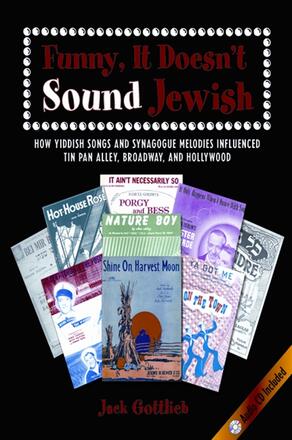
Funny, It Doesn't Sound Jewish
How Yiddish Songs and Synagogue Melodies Influenced Tin Pan Alley, Broadway, and Hollywood
Alternative formats available from:
Documents the influence of Jewish music on American popular song.
Description
In Funny, It Doesn't Sound Jewish, Jack Gottlieb chronicles how Jewish songwriters and composers transformed the popular music of mid-twentieth-century America. Although many critics, historians, and musicians have alluded to the Jewish influence on American popular song, this is the first book ever to support such assertions with comprehensive musical examples. Drawing on a variety of historical and archival sources, as well as his own experiences as a composer of synagogue, popular, and concert music, Gottlieb carefully and compellingly documents how a minority culture infused a majority culture, enriched it, and still retained its own identity. He does this with the support of a companion CD that includes previously unrecorded songs as well as some surprising rarities performed by the likes of Judy Garland, Billie Holiday, and Leonard Bernstein.
Author and composer Jack Gottlieb has lectured on the Jewish contribution to American popular music throughout the United States, Canada, and Israel. He is past president of the American Society for Jewish Music and has received wide recognition for both his synagogue and secular music. He has been a reviewer and author of articles on music as well as an annotator for concert program and record jacket notes. His choral, chamber, and theater and cabaret works, as well as his sacred music—including Songs of Godlove, over 50 solos and duets—are available in print. His recordings appear on the Naxos, Albany, and other labels. He lives in New York City.
Reviews
"Gottlieb is a superbly equipped tune detector … No serious student of the music of Tin Pan Alley, Broadway, and Hollywood can afford to bypass this landmark study." — American Music
"Gottlieb's writing style is amiable, anecdotal, and breezy, and his enthusiasm for his topic is contagious." — Kurt Weill Newsletter
"Gottlieb's impressive book Funny, It Doesn't Sound Jewish traces the influence of Jewish secular and synagogue music on Tin Pan Alley, Broadway, and Hollywood with pointed wit, but underlying seriousness." ― Turok's Choice
"…expands Gottlieb's long-standing and popular lecture on the importance of Jewish sacred, folk, and popular idioms in American popular music … Gottlieb teases out many historical threads not obvious to the casual listener." — CHOICE
"Accompanied by a CD with 70 minutes of great musical examples, [Funny, It Doesn't Sound Jewish] is full of wisdom, wit, practical information, clever musical twists and turns and will become a classic. It's a literary jewel and laypersons as well as seasoned cantors are guaranteed to love it and learn from it." — Koleinu
"…exhaustive and lively … Out of this impressive musicological sleuthing comes a highly readable, fascinating account of a sometimes hidden, sometimes obvious chain of cultural influences … accessible to all readers." — Jewish Book World
"In his introduction to this meticulously researched study of Jewish-influenced theatrical and popular music from 1914–1964 … Gottlieb observes, 'For the first time since ancient history, when synagogue cantillation influenced church plain chant, Jews contributed significantly to the music of the mainstream.' … The melodic passages cited on almost every page will be of most value to the musically sophisticated. On the other hand, everyone will be able to appreciate the accompanying 70-minute CD, which includes a marvelous, very Yiddish recording by Judy Garland … as well as Leonard Bernstein at his piano … This is a loving, comprehensive and fascinating book." — Publishers Weekly
"…as delightful as it is informative … This is a book that people will want to flip through and stay to read in large chunks. It's that good and, I would add, that important." — Hadassah Magazine
"Jack Gottlieb's Funny, It Doesn't Sound Jewish is an always informative, always entertaining account of that remarkable musical evolution of the simple songs of the shtetl and the fervent chants of the synagogue into many of the most memorable songs of the 'golden age' of American popular song. It is a volume to be studied and savored." — Milton Babbitt
"As any initiate of showbiz knows, the lore and heritage of Yiddishkayt simmers just beneath the surface of much of the entertainment world's most venerable traditions. Now, thanks to Jack Gottlieb's hugely entertaining and inclusive book, all Broadway and popular music enthusiasts can have an instant insight into these poignant and amusing connections. Along the way, Gottlieb offers wonderful bouquets of Tin Pan Alley, opera house, backstage, and publishing gossip, which bring a smile to our lips and remind us that nothing ever really changes. The book offers lots for a musician, and at the same time, very much for the general reader, who is sure to pick up some great one-liners and party talk from this fascinating work." — Michael Tilson Thomas
"Funny, It Doesn't Sound Jewish is a marvelous book, meticulously researched and a pleasure to read. Jack Gottlieb has filled in the gaps on an era that deserves greater recognition. Bravo on a great job!" — Michael Feinstein
"Jack Gottlieb knows how to talk, knows what he's talking about, and what he's talking about is worth heeding. Taking off from the general premise—that language shapes music—he shows how the Jewish sensibility has specifically shaped Broadway musicals, including those by gentiles. This he does from every possible angle: historic, linguistic (vocal inflection, punning nuance, Yiddish jokes, etc.), and musical (harmony, counterpoint, rhythm, color, and especially tune). His thesis is sometimes daft, often bold, usually original, and always comprehensible. This book is indispensably informative." — Ned Rorem
"Jack Gottlieb has produced a remarkably witty and enjoyable, yet serious historical examination of popular music. Copious musical examples and the inclusion of a CD of rarities are delightful bonuses. Funny, It Doesn't Sound Jewish is a significant contribution to American arts and letters." — Gunther Schuller